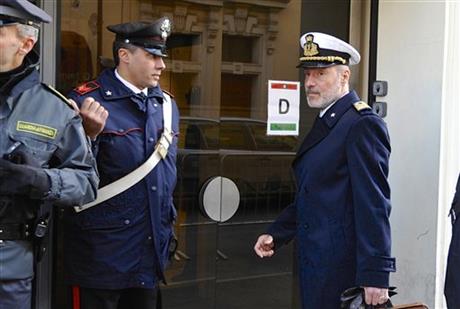
By FRANCES D’EMILIO
Coast Guard Capt. Gregorio De Falco, right, arrives at the Grosseto court, Italy, Monday, Dec. 9, 2013. A Italian Coast Guard official has testified that hundreds of people were still aboard the shipwrecked Costa Concordia when the commander abandoned the cruise liner in a lifeboat. Coast Guard Capt. Gregorio De Falco become a national hero after repeatedly ordering Francesco Schettino, the Concordia’s commander on trial for manslaughter and abandoning ship, to return to the badly listing vessel. Schettino is also charged with causing the 2012 shipwreck by sailing too close to the Tuscan island of Giglio. A reef gashed the hull, water rushed in and 32 people died. (AP Photo/Giacomo Aprili)
Italy Shipwreck Trial
Coast Guard Capt. Gregorio De Falco, right, and his wife Raffaella arrive at the Grosseto court, Italy, Monday, Dec. 9, 2013. A Italian Coast Guard official has testified that hundreds of people were still aboard the shipwrecked Costa Concordia when the commander abandoned the cruise liner in a lifeboat. Coast Guard Capt. Gregorio De Falco become a national hero after repeatedly ordering Francesco Schettino, the Concordia’s commander on trial for manslaughter and abandoning ship, to return to the badly listing vessel. Schettino is also charged with causing the 2012 shipwreck by sailing too close to the Tuscan island of Giglio. A reef gashed the hull, water rushed in and 32 people died. (AP Photo/Giacomo Aprili)
Prev 1 of 2 Next
ROME (AP) — Hundreds of people were still aboard the Costa Concordia when the commander fled in a lifeboat, an Italian Coast Guard official testified Monday, adding that rescuers received first word of the seriousness of the shipwreck only after a passenger used a cell phone to call family.
Coast Guard Capt. Gregorio De Falco became a national hero after repeatedly ordering Francesco Schettino, the commander on trial in Grosseto, Tuscany, to return to the badly listing vessel.
Schettino is charged with manslaughter, abandoning ship and of causing the 2012 shipwreck by sailing too close to the Tuscan island of Giglio. The Concordia smashed into a reef, which gashed the hull, sending sea water pouring in. Thirty-two people died.
De Falco told the court that the Concordia sent out its first distress signal 53 minutes after the Jan. 13 collision. Until then, he said, the ship’s officers kept “giving us reassurances about the situation on board,” insisting that the Concordia had only suffered a power blackout.
But De Falco, who was based in a port controlling the waters near Giglio, said he didn’t believe Schettino’s reassurances.
He testified that police on the mainland informed the Coast Guard that a relative of a passenger called them to say that passengers had been ordered to don life vests, and that furniture was falling around them as the cruise liner started listing badly to one side. A customs police boat, which had rushed to the scene, also told the Coast Guard the ship had capsized.
The court heard recorded phone conversations between De Falco and Schettino, including a conversation that captivated the nation in which De Falco repeatedly orders Schettino to get back aboard, at one point saying he is relieving the Concordia captain of his command. The call ends with an exasperated De Falco’s uttering an expletive after shouting at Schettino.
Also played in court was a recording of another conversation in which Schettino is aboard a life boat and mumbles that there are “at most about 10 people” still on the Concordia. But the Coast Guard had heard that as many as 300 of the 4,200 passengers and crew were still aboard, the court was told.
“Do you see people in the water?” De Falco asks Schettino. “Yes, I scooped up some with my lifeboat,” Schettino replies. He says there are still 10 people aboard, “but I cannot see all the ship.”
De Falco is also heard asking Schettino if there are women and children in the water and if some are jumping off the Concordia into the sea. He later tells Schettino: “You saved yourself, but I will make a lot of trouble for you.”
De Falco, dressed in his uniform for his court appearance, said he ordered rescuers to be lowered from a helicopter to pluck to safety dozens of people who were clinging to railings and other parts of the ship.
Many passengers and crew dove into the sea to try to escape, when lifeboats could no longer be lowered because of the Concordia’s tilt. Autopsies found that many of the victims who weren’t evacuated drowned aboard the ship, as water surged down corridors outside cabins and elevator shafts.
Schettino risks 20 years if convicted. He insists the reef wasn’t on the ship’s navigational charts and that he helped direct the evacuation after reaching land.
The Italian news agency ANSA, reporting from Grosseto, said Schettino had his head down and chatted with defense lawyers when the court listened to the conversation.



